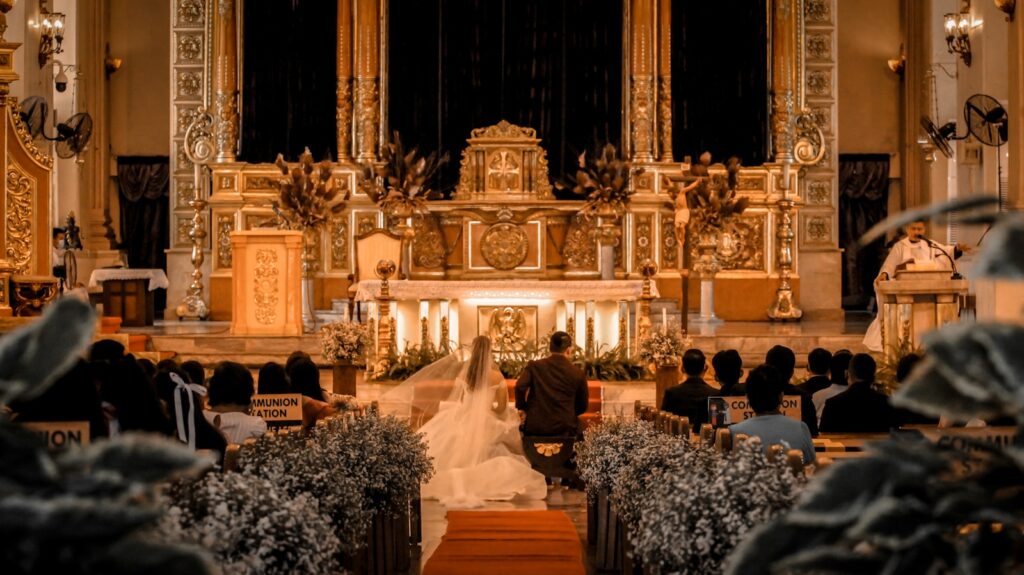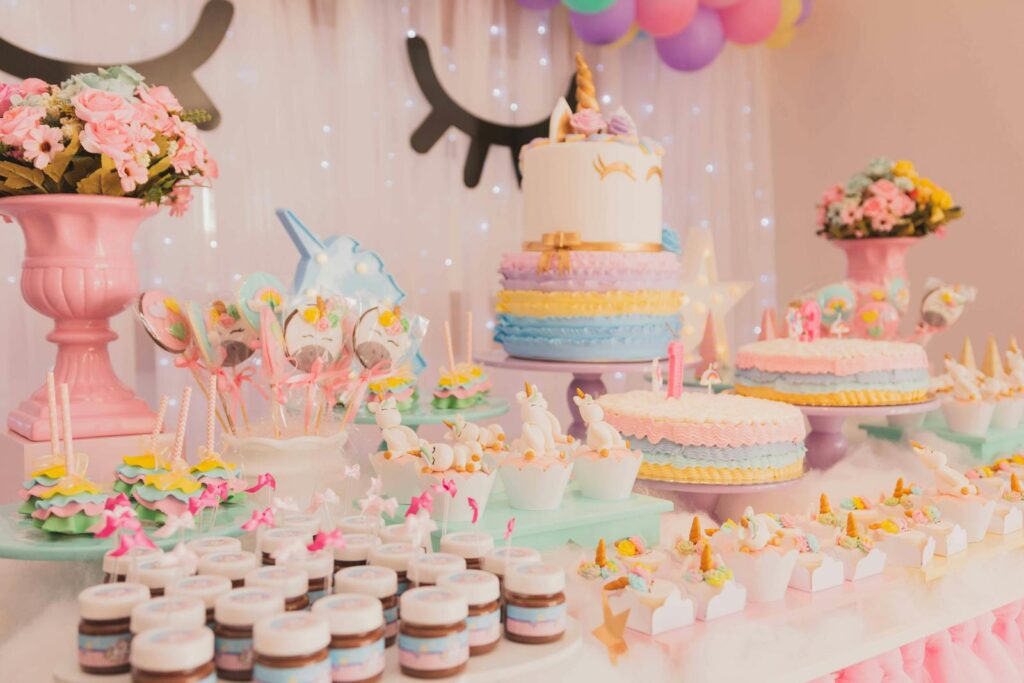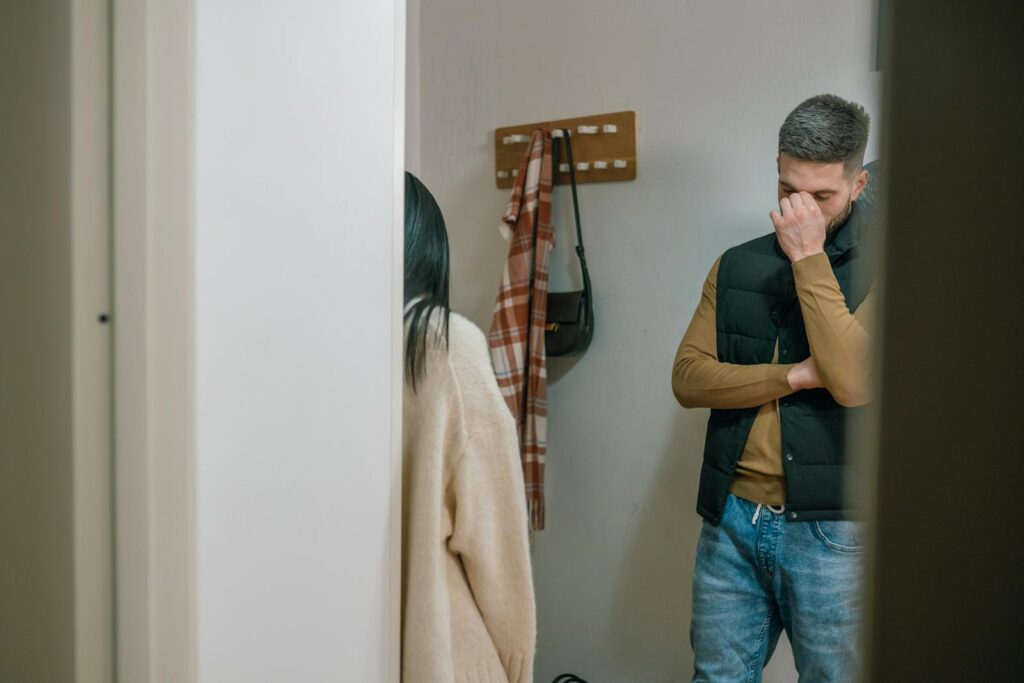
Much of daily life isn’t about choice. It’s about fitting in. People go along with routines, appearances, even milestones because that’s what’s expected. Sometimes it’s harmless, sometimes it’s heavy. Rarely do we pause to ask: do I even want this, or am I doing it for show? Social pressure doesn’t always shout. It’s quiet, woven into habits and often mistaken for genuine desire.
Wearing Uncomfortable Clothes

High heels that ache, suits that trap heat, ties knotted too tight. Many dress not for comfort but because it’s “the standard.” We see it at weddings, offices, interviews—outfits chosen less for function than for appearance. Few admit they’d rather wear sneakers or loose cotton. The clothes become costumes. Fashion sells individuality, yet most follow codes. Pain and restriction wrapped in fabric, simply because that’s what society expects.
Hosting Big Weddings

Two people want to marry. Somehow it becomes 300 guests, centerpieces, five-tier cakes, and bills that linger for years. For many, the celebration isn’t about the couple—it’s about family expectations, cultural performance, and public display. Smaller, quieter ceremonies feel almost rebellious. Yet countless couples bend under pressure, throwing events they can’t afford or don’t even enjoy. The wedding isn’t always for love. It’s often for tradition.
Celebrating Every Holiday the Same Way

Lights strung in December, sweets exchanged in October, fireworks on a summer night. Many follow rituals because they’re prescribed and not because they bring joy. The expectation is strong: skip a holiday and you’re labeled a grinch or ungrateful. For some, it’s fun and for others, exhausting. The sameness masks the truth that people often celebrate because not celebrating would need too much explanation.
Buying Greeting Cards

Rows of folded paper with canned words. Birthdays, anniversaries, holidays—cards handed over with a signature at the bottom. It’s not always about sentiment. It’s about not being the one who shows up empty-handed. Some keep the tradition alive; others toss them after a glance. Cards survive less on meaning than on expectation, a ritual that feels hollow but still persists because it’s easier than breaking the norm.
Going to College Without Question

For many, it’s not about curiosity or career—it’s the next box to tick. Families beam at the acceptance letter. Society praises the diploma. Few stop to ask whether it’s the right path for them, whether trade, travel, or other routes might suit better. College is valuable, but it isn’t universal. Still, people sign up, take loans, attend classes they hate, because stepping off the conveyor belt feels dangerous.
Owning a House

“Renting is throwing money away.” That line pushes countless people into mortgages they may not even want. Owning house is painted as stability and success. But not everyone is interested in the yard work and the debt stretching decades. Many still buy because it’s the milestone society expects. The house becomes less of a home and more like a trophy.
Having Children

The unspoken script: grow up, get married, have kids. For many, it’s beautiful. For others, it’s a pressure that bends their lives in directions they never chose. Questions like “When are you starting a family?” are treated as harmless, yet they carry weight. Parenthood should be a choice, not a default. Still, many follow the path because society doesn’t leave much room for “no.”
Throwing Birthday Parties

Some people love them. Others would rather spend the day quietly. Yet pressure to throw a party—or at least host a gathering—remains. From kids’ birthdays with balloons and clowns to adult dinners with cake and candles, the ritual is repeated even when enthusiasm is low. Saying “I don’t want a party” feels rude or ungrateful. So people gather, smile for pictures, and go along with the script.
Posting Milestones Online

Graduations, engagements, new jobs. The pressure to announce everything online has become a modern social rule. Not posting feels like hiding. Sharing becomes less about joy and more about proof: proof of progress and success. Likes stand in for applause. Many upload not because they want to but because silence would invite questions. Life events turned into content, curated for an audience of peers.
Keeping a 9-to-5 Schedule

Plenty of jobs could flex. Plenty of people work better at different hours. Still society clings to the 9 to 5 as the right rhythm. Even in remote work, people feel guilty logging off early even if they’ve finished. The clock dictates value and not the quality of work. The schedule survives because it’s familiar, not because it’s efficient. People follow it because stepping outside feels like breaking the rules.
Hosting Holiday Dinners

Families gather, tables bend under dishes, and one person shoulders most of the labor. Many hosts don’t love the work—they love fulfilling the expectation. Skipping feels unthinkable, as though it would fracture tradition. Exhaustion and stress are brushed aside because society expects a spread. The laughter and warmth are real, but so is the quiet resentment in kitchens. Hosting, for many, is obligation dressed as joy.
Wearing Makeup Daily

Plenty of people enjoy makeup as expression. But many wear it not out of choice, but pressure. To look “professional.” To look “put together.” To avoid comments about looking tired. Morning routines stretch longer than needed, money flows into products, not always from joy but expectation. The bare face feels like breaking etiquette. The mask becomes daily armor, not always by choice.
Exchanging Gifts Constantly

Birthdays, anniversaries, holidays, weddings, baby showers—gift after gift, often for people barely known. The practice runs on obligation. Skip a gift, and you risk being seen as careless. Many spend money they don’t have on items others don’t need, simply because it’s the standard. Gifts can be lovely. But the endless cycle survives more on pressure than generosity.
Retirement as the End Goal

Work decades, save, wait for the day you can finally live. Society sells retirement as the destination. People push through jobs they hate, promising themselves freedom later. But the structure is inherited, not questioned. Some thrive, others arrive at retirement too tired or ill to enjoy it. Yet still, the expectation persists: grind now, live later. Few dare to ask—what if I lived now instead?
Staying in Unhappy Marriages

Divorce carries stigma in many places. So couples stay, long after love has gone because leaving feels like breaking society’s rules. They smile at gatherings, post happy pictures and maintain the illusion. The weight of “what will people say” keeps them tethered. Society praises endurance over honesty and stability over truth. Many stay not for themselves, but because expectation makes walking away feel like failure.

